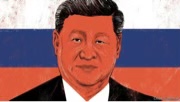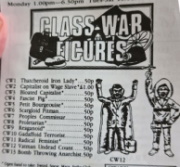|
Some Guy TT posted:i have a gun tweet in honor of the new title warren burger
|
|
|
|

|
| # ? May 24, 2024 21:32 |
|
Megamissen posted:warren burger pow-wow chow
|
|
|
|
  McClellan was such a loving loser holy poo poo
|
|
|
|
A copperhead and traitor from Munson's Hill onwards. If you haven't already, definitely check out the Radio War Nerd episode on McClellan and his aide de camp Thomas Key.
|
|
|
|
Yeah, there's a point where it becomes hard to think McClellan wasn't an outright traitor sabotaging the North.
|
|
|
|
Dr. Jerrold Coe posted:The US govt still denies it and there's a hack named Milton Leitenberg who trots out his "secret Russian documents" that "disprove" the allegations whenever they're in the news. The documents were "found" by a right wing Japanese journalist for Sankei Shimbum, a paper that denied Imperial Japanese warcrimes, and the documents themselves are hand written copies of supposed originals, "authenticated" by a colleague of Leitenberg based on what amounts to a vibes check. Even if the documents were authentic, the context of Soviet admission of fraud is Beria trying to throw a rival under the bus for believing the Chinese/Koreans about the BW - basically a macguffin issue for Beria's power play. Leitenberg has been banging this drum since 1999 and the original documents the transcribed copies are based on have never surfaced. Wormwood had got me mostly on board with frank olsens LSD Flight being a CIA hit for refusing to cooperate on live entemelogical warfare, then the last episode is seymour hersh showing up and looking confused and going "yeah one of my informants saw the kill order I'm pretty sure I said this before" . Then it just got added to the mental list of things that absolutely happened and you just don't discuss around people who arent already frothing communists extensive documentation of the mosquito breeding programs used to actually kill americans in multiple different states but it's not like we'd use them for real guys
|
|
|
|
Spangly A posted:Wormwood had got me mostly on board with frank olsens LSD Flight being a CIA hit for refusing to cooperate on live entemelogical warfare, then the last episode is seymour hersh showing up and looking confused and going "yeah one of my informants saw the kill order I'm pretty sure I said this before" . Then it just got added to the mental list of things that absolutely happened and you just don't discuss around people who arent already frothing communists I'm sorry you're gonna havta explain everything in this post.
|
|
|
|
mycomancy posted:I'm sorry you're gonna havta explain everything in this post. the "you shouldnt take lsd it makes you think you can fly one guy took lsd and flew out a window and died" myth, that I was explicitly taught at school, comes from the us govt trying to explain why one of their senior bio/insect warfare researchers (he was one of the weaponised anthrax team iirc) was found dead outside a hotel during the korean war. The official line is that the head of MKUltra dosed him with lsd, as a prank, and sadly he killed himself. Wormwood is a show by Errol Morris and the bioweapon guy's son that flips between documentary and true crime reenactment to argue that he was dosed because the CIA still thought LSD was a truth serum, and they suspected him of planning to defect to the soviets in protest at his research being used in korea. Seymour Hersh shows up in the last episode and just straight up says "yeah I had an informant find the paperwork during the rockerfeller comission, they killed your dad" Milton Leittenberg is the only person ever available to argue against the pretty reasonable conclusion that the CIA on drugs could not stop themselves doing weird, evil nazi poo poo, because there's a whole load of declassified operations that basically go "what if we breed a million mosquitos and give them diseases and drop them on black towns in florida/georgia/wherever", and not that many people that want to go to the papers and go "yes thats true but its not like we used them on foreigners". He shows up pretty quick if you google the show
|
|
|
|
https://twitter.com/tanvi_madan/status/1642353660234440710
|
|
|
|
https://twitter.com/DrRadchenko/status/1642768744974897158
|
|
|
|
There's a pretty horrifying article I just read this morning about the mass rape directed against Bangladeshi women during the liberation war in 1971. CW: this article includes a lot of discussion of rape and sexual assault. Whenever the next time comes around that people are making ranked lists of US presidents and somebody tries to say well actually Nixon wasn't that bad, remember that even though they were warned by the American diplomats in East Pakistan that "the overworked term genocide is applicable" to the situation, his administration fully supported Pakistan during this time, shipped them huge amounts of military aid, and when Indira Gandhi's India intervened to end the genocidal campaign against the people of Bangladesh, Nixon sent an aircraft carrier into the Indian Ocean as a show of force to try and get them to withdraw, and when they didn't, Nixon and Kissinger privately fumed about it because they viewed ending this genocidal campaign of mass rape as a Cold War defeat:Odd Arne Westad posted:Nixon and Kissinger, in conversations that oozed racism and misogyny, fumed that "the bitch" had tricked them. "We'll be paying for it for a long time ... It will be interesting," Kissinger told the NSC, "to see how all those people who were so horrified at what the Paks were doing in East Pakistan react when the Indians take over there." "What we are seeing here," Kissinger told the president, "is a Soviet-Indian power play to humiliate the Chinese and also somewhat us.... And the effect of that will be on all other countries watching it is that the friends of China and the United States have been clobbered by India and the Soviet Union." The Nixon Administration set out to punish India as best it could. Another relevant part of the article: quote:The doctor also reflected on his conversations with soldiers who had taken part in the rapes but could not seem to understand what all the fuss was about.
|
|
|
|
vyelkin posted:There's a pretty horrifying article I just read this morning about the mass rape directed against Bangladeshi women during the liberation war in 1971. CW: this article includes a lot of discussion of rape and sexual assault. Whenever the next time comes around that people are making ranked lists of US presidents and somebody tries to say well actually Nixon wasn't that bad, remember that even though they were warned by the American diplomats in East Pakistan that "the overworked term genocide is applicable" to the situation, his administration fully supported Pakistan during this time, shipped them huge amounts of military aid, and when Indira Gandhi's India intervened to end the genocidal campaign against the people of Bangladesh, Nixon sent an aircraft carrier into the Indian Ocean as a show of force to try and get them to withdraw, and when they didn't, Nixon and Kissinger privately fumed about it because they viewed ending this genocidal campaign of mass rape as a Cold War defeat: There was an episode of RWN about this and one of the funny parts was that apparently Kissinger was reassuring Nixon all the way that the Chinese just would have to intervene on the Pakistanis side. Can't just let them humiliate you, you see.
|
|
|
|
This movement among the Jews is not new. From the days of Spartacus-Weishaupt to those of Karl Marx, and down to Trotsky (Russia), Bela Kun (Hungary), Rosa Luxemburg (Germany), and Emma Goldman (United States), this world-wide conspiracy for the overthrow of civilisation and for the reconstitution of society on the basis of arrested development, of envious malevolence, and impossible equality, has been steadily growing. It played, as a modern writer, Mrs. Webster, has so ably shown, a definitely recognisable part in the tragedy of the French Revolution. It has been the mainspring of every subversive movement during the Nineteenth Century; and now at last this band of extraordinary personalities from the underworld of the great cities of Europe and America have gripped the Russian people by the hair of their heads and have become practically the undisputed masters of that enormous empire. […] Although in all these countries there are many non-Jews every whit as bad as the worst of the Jewish revolutionaries, the part played by the latter in proportion to their numbers in the population is astonishing.
|
|
|
|
I should like to put it on record that I have never been able to dislike Hitler. Ever since he came to power I have reflected that I would certainly kill him if I could get within reach of him, but that I could feel no personal animosity. The fact is that there is something deeply appealing about him. […] One feels, as with Napoleon, that he is fighting against destiny, that he can’t win, and yet that he somehow deserves to. […] However they may be as economic theories, Fascism and Nazism are psychologically far sounder than any hedonistic conception of life.
|
|
|
|
Thanks for the input Eric
|
|
|
|
C-SPAM › [Modern History] Gun Condoms and Electricity
|
|
|
|
https://www.spiegel.de/international/zeitgeist/the-blue-hole-in-the-red-sea-is-the-deadliest-dive-site-in-the-world-a-844099.htmlquote:The dead also include Karl Marx, an Austrian: Jan. 10, 2007.  
|
|
|
|
https://twitter.com/IlvesToomas/status/1643595071021883393
|
|
|
|
vyelkin posted:There's a pretty horrifying article I just read this morning about the mass rape directed against Bangladeshi women during the liberation war in 1971. CW: this article includes a lot of discussion of rape and sexual assault. Whenever the next time comes around that people are making ranked lists of US presidents and somebody tries to say well actually Nixon wasn't that bad, remember that even though they were warned by the American diplomats in East Pakistan that "the overworked term genocide is applicable" to the situation, his administration fully supported Pakistan during this time, shipped them huge amounts of military aid, and when Indira Gandhi's India intervened to end the genocidal campaign against the people of Bangladesh, Nixon sent an aircraft carrier into the Indian Ocean as a show of force to try and get them to withdraw, and when they didn't, Nixon and Kissinger privately fumed about it because they viewed ending this genocidal campaign of mass rape as a Cold War defeat: God, 71 was really our finest hour. Not the raping and stuff of course. Ending that poo poo.
|
|
|
|
https://twitter.com/BriannaATucker/status/1644380135909367808
|
|
|
|
When she says the name, Berliner Luft, her friend Claire Machky immediately recognizes it for something else. Berliner Luft means Berlin Air, and the city’s unofficial anthem celebrated unpolluted freedom. When it debuted in 1922, Berlin was popular with Russians fleeing the Bolshevik Revolution, including a young couple that had made vodka and spirits in St. Petersburg. The Schilkin family brought recipes and their 6-year-old son Sergei to Berlin, where they bought an old farm and started production. The operation was destroyed during World War II, but Sergei Schilkin built it back up. His son-in-law, Peter Mier says the market was strong. Vodka for the Russian Army, he says, was the best thing you could have. And the business grew to be very successful. But the part of Germany occupied by the Soviet Army was the part that became East Berlin and East Germany. When the Berlin Wall went up in August 1961, Sergei’s daughter fled with Peter Mier to West Germany. Even though his parents had fled communism in Russia, Sergei Schilkin stayed in East Berlin, out of obligation to the family business and to its employees. Eventually, the government seized ownership of the firm. And he retired in early 1980s. Then, 25 years ago this weekend, the unthinkable happened: The Berlin Wall fell. The next year, 1990, Germany was a reunited country, no east or west. The government gave back the private property that been nationalized, and Sergei Schilkin got his company back. At the age of 75, he came out of retirement to run the family business again, joined by his son-in-law who had fled East Berlin some 40 years earlier. Peter Mier says the most difficult thing was adapting the company rapidly to the free market. In East Germany, he says the biggest problem was getting raw materials to make spirits. Selling what you made was easy – because the government guaranteed it. After the Wall came down, it was exactly the opposite. You could get anything you wanted, but it was very hard to sell your products. That problem was compounded by West German supermarket chains buying out East German stores. The new owners had their own suppliers of vodkas and schnapps, from the west. Longtime Schilkin employee Ulrike Gronow remembers how hard it was those first few years. She says anybody who had a car with a trailer headed out with a full load and sold what they could at open-air markets — often for very low prices, but it worked. Eventually, many Germans in the east grew tired of all the shiny, new products from the West and returned to their old tastes. Meanwhile, the company used government financing to invest in new bottling technology and conveyor machines. Before the Wall fell, 180 people did most of the work by hand. Now, just 45 people remain. Last year they and the machines churned out 22 million bottles of liquor. But the struggle to compete is far from over; the liquor industry in Germany is declining. East Germans drank 12 bottles a year on average before the Wall came down. Nowadays, thanks to health concerns and more beverage options, that’s been cut in half. Liquor consumption is also down in the West. Leading the company in this weakening market is the fourth generation of the Schilkin family, Peter Mier’s son Patrick. He says west German spirits makers have a decades-long head start, having made lots of money in the 1970s and 80s. "And of course, we never had that time," Patrick Mier says. "In 1990, it was a new start for us. Of course we have the history, we have the feeling of a company with a hundred years tradition: recipes, knowledge. But, you know, from the economic side, we were a startup. A new company. It's a startup that’s enduring growing pressures from a globalized economy. Schilkin’s costs soared when gas and grain prices spiked a few years ago. It has been losing money on each bottle it filled under a private label for a supermarket chain. Six weeks ago, Schilkin ended that huge contract, and the 25-year-old company with a 100-year history is betting its future on a product from its past. Back in the 1950s, Sergei Schilkin trademarked the name Berliner Luft for his brand of a peppermint schnapps. The former head of the German spirits association, Erlfried Baatz, says the revived product has struck a chord with many of the young people moving to Berlin for the excitement and opportunities of the growing, reunited city. "And Berlin air, therefore the name Berliner Luft, Berlin air is a part of this. Because air is fresh, air is open. Air gives you fresh mind. And it’s part of this revolution, too," Erlfried Baatz says. Some use Berlin Luft to make a Peppermint-style mojito. A local soccer team fan club has adopted the liquor as its game-day drink. And with the iconic name, sales to tourists have soared. "With this kind of product, we are building our own future," says Schilkin CEO Patrick Mier. "This is what I learned from my grandfather. That it is absolutely necessary to move, to develop things, to break with parts of what you did before, without losing your tradition. And this is what Berliner Luft stands for." Like East Berlin, the Schilkin company is reinventing itself, making its own future without forgetting its past, building on its 20th century history with a free-loving spirit that decades of communist rule could only dampen, but never extinguish.
|
|
|
|
so ive been watching the new perry mason series and im really bugged by how theres this huge plot point about illegal oil shipments to japan and this makes no sense to me the story takes place in 1933 and as far as i know there wasnt any serious effort to restrict oil trade to japan until like the forties and this was such a huge deal it literally started a war is anyone aware of any circumstances under which illegal oil trade to japan as opposed to legal oil trade would have been a sensible business decision in the early thirties or are the perry mason people just assuming that the united states being a country that loves freedom would have been horrified at the idea of doing oil trade with a bad country that invades other countries like japan was doing at the time
|
|
|
|
code:My reply to the author: "Sorry to see you are using this deeply offensive and negationist term in your title. I will not be reading your book." "It was neither a dirty war nor a clean war, it was state terrorism" - Estela de Carlotto, 11 August 2016 The "Dirty War" term was dismissed already during the Trial of the Juntas in 1985, when the court ruled there was no "war" and that the term was used by the Juntas to relativize the magnitude of their crimes by framing them in the fake context of a fake civil war. Despite its victim-blaming overtones, US academics continue using the hateful "Dirty War" term in their papers, university presses in their book titles, out of moral laziness, because of it's high-recognition value or maybe out of remnant sympathy for anti-communist regimes. The use of the "Dirty War" term by US academics is one of the few victories of the 1976-83 dictatorship in its long-term "cultural war". Death camp survivors revile it, as do groups such as Abuelas, above. But many in US academia stand by the repulsive victim-blaming shorthand. I endured the dictatorship, threatened, wiretapped, with a green Ford Falcon outside my home, thugs at the wheel. People I knew, mothers, a sister, brother, a father of desaparecidos, were thrown from planes. Persons I tried to save by reporting their cases, perished nonetheless. I was there. There was no war. The Juntas trial found there was no war. The judges looked into the “Dirty War” defense but dismissed it, finding the guerrilla bands too small, no wide support, did not occupy a square metre of territory, posed no credible threat. No dirty war. But US academics cling desperately to this offensive, negationist, victim-blaming term, dismissed by the Juntas trial as false four decades ago. How? Why? Because it’s catchy? And how dare you opine that the Abuelas, or death camp survivors, or I find your use of it offensive? How dare US academics opine how I should feel about a US university using "Dirty War" in the title of a book? People I knew, housewives, young women, were thrown from planes. So, no, I will not read your book. Shame on you, N press. Shame on you, academics who blurbed this title. The irresponsible use/misuse of the "Dirty War" term by US academia has gone too far. Plus, having to endure opinions how survivors, Abuelas, or I should feel... No. It has to stop. How dare NUP use this perpetrator-lexicon in a book title? No more. Change the title. It's time. ‘Words matter and terms like “dirty war” cannot be used innocently. There was no war; there was only persecution, torture, disappearance, extermination. We cannot echo the junta language and we cannot reproduce its narrative.’ Jacobin: Argentina’s Dictatorship Was Not a “Dirty War.” It Was State Terrorism. ‘Terms like Dirty War cannot be used innocently’ The perpetrator-lexicon title is a blemish on the book, its author and the publisher, a major US university. The 1985 Juntas Trial trashed the DW defense as justifying crimes against humanity. How can a US university ignore that?
|
|
|
|
Some Guy TT posted:so ive been watching the new perry mason series and im really bugged by how theres this huge plot point about illegal oil shipments to japan and this makes no sense to me the story takes place in 1933 and as far as i know there wasnt any serious effort to restrict oil trade to japan until like the forties and this was such a huge deal it literally started a war I think we were giving the Japanese all the oil they could buy till the embargo in '41. This sucks, I was looking forward to watching the new season of that show and this sounds annoying enough to pass on it
|
|
|
|
https://twitter.com/qjurecic/status/1651974987413090309
|
|
|
|
in CSPAM it's become A Thing for the kind of "we need another March to the Sea/we need Uncle Billy to make Georgia howl again" to be somewhat unseemly Earl Hess's "Civil War Logistics" then makes a more daring claim: what if the March to the Sea was unnecessary, in the first place? quote:Sherman also was responsible for the largest troop transfer of the war, although he rarely gets credit for it. Much has been made of the March to the Sea and through the Carolinas as an exercise in political strategy, and they certainly were campaigns designed in part to strike a blow to Confederate logistics, supply, and especially public morale. But Sherman’s most fundamental and important goal in both campaigns was to shift 60,000 western veterans to aid Grant’s campaign at Petersburg and overwhelm Lee’s Army of Northern Virginia. All other benefits of this grand march were of secondary importance.56
|
|
|
|
gradenko_2000 posted:in CSPAM it's become A Thing for the kind of "we need another March to the Sea/we need Uncle Billy to make Georgia howl again" to be somewhat unseemly no u
|
|
|
|
It is kinda grimly funny that Sheridan's campaign in the Shenandoah was much more destructive but he mostly hurt redneck peasants while Sherman was tearing through the plantations
|
|
|
|
quote:Federal steamboats became a target soon after Union forces captured long stretches of the Mississippi River. Ironically, much of that Union success came with little fighting. Columbus fell without a battle, and the Federals captured New Madrid and Island No. 10 through maneuver rather than combat. Union troops occupied Helena, Arkansas, without a struggle by July of that year. At the same time, other Federal forces captured New Orleans with little bloodshed, occupied Baton Rouge, sailed past Port Hudson, and nearly secured Vicksburg by mid-summer of 1862. Northern armies captured most of the Confederate section of the Mississippi River faster and more easily than anyone could have guessed. ___ quote:Previously, it had been impossible for guerrillas and regularly organized Confederate units to distinguish between a steamer that was carrying military supplies and one that hauled only civilian freight. Now Seddon recognized that a mainly commercial targeting strategy was called for, and any scruples he or other Rebel authorities may have had about firing on boats containing women and children evaporated. “Great moral and political results must follow from thus practically exhibiting the impossibility of commanding the Mississippi,” he told Edmund Kirby Smith, commander of the Trans-Mississippi Department. “The river may be as effectually closed to the enemy’s trade, and they as much prevented from obtaining supplies of cotton, as if we had continued to hold Vicksburg.” In Seddon’s mind, harassing river traffic would demonstrate to northwesterners that they could never use “the Mississippi as an avenue of trade without peace and amity with the Confederate States.”11 Poster's note: this reads to me as the Confederacy embracing what we would later term "unrestricted submarine warfare" quote:Confederate authorities initiated a new twist in the river war when they recruited special agents to act as saboteurs. The Engineer Bureau lined up at least seven men who were willing to plant explosives on river steamers in return for the value of half the property they destroyed plus all the guns and munitions they captured through the use of “their new inventions.” Seddon approved this scheme in late August 1863. An additional nine men were soon added to the list. Exactly what these 16 agents did is unclear, but the Richmond government was keen to use subterfuge as a weapon against Mississippi River shipping. Jefferson Davis suggested planting submarine torpedoes in the river to blow up civilian boats. A shadowy plot supported by a judge named Tucker led to some activity even before the fall of Vicksburg, supported by $20,000 drawn from the Confederate Treasury and urged on by Governor John J. Pettus of Mississippi. Exactly who these men were and what they did is obscure, but by October 1863 they were claiming great success and Joseph E. Johnston supported those claims.31
|
|
|
|
quote:[The Charity Organization Society] tightened standards. "Gratuitous charity," [Commissioner Josephine] Lowell said, "works evil rather than good." Authorizing assistance for a widow with infants might make her life easier, but then the mother might, "by being relieved of anxiety for them, lose her love for the children." New York around 1890. This book sure is doing a good job of making you wish for a Red Terror.
|
|
|
|
Imagine I'm a 14th century French King. And I'm about to go to war with the perfidious English. And I've got huge depots of pigs, cows, war bread, everything you need to sustain an army. Back of the line I've also got all these armouries and armourers, ingots of iron, workshops, everything we need to sustain a campaign. My army is in the field. Men at arms, peasant levies, foreign mercenaries, all that. And, of course, the heavy cavalry. The nobles. Imagine that the English somehow have Lancaster bombers, only one time, and they do a bombing raid, and they take out all the nobles and all our heavy cavalry. But don't touch the stores of food or the blacksmiths or the infantry or anything else, somehow, by some miracle. Of course we could fight anyway! This is what happened at Pearl Harbor 12/7/41
|
|
|
|
but nobles are important tho??? how do you run an army without all the best leaders
|
|
|
|
What
|
|
|
|
Some Guy TT posted:but nobles are important tho??? how do you run an army without all the best leaders Exactly this. How do you have a 14th century war without nobles?? How do you have a 20th century naval war without battleships?? This was the parallel I was trying to draw and you got it immediately
|
|
|
|
How do you fight ww3 without posters
|
|
|
|
|
hopefully we'll never know
|
|
|
|
more like poopl harbor
|
|
|
|
I'm terrified of the idea of going back in time because I'm scared at the idea of old style dentistry and also never being able to post again
|
|
|
|
Teriyaki Hairpiece posted:I'm terrified of the idea of going back in time because I'm scared at the idea of old style dentistry and also never being able to post again just keep your spacesuit on
|
|
|
|

|
| # ? May 24, 2024 21:32 |
Teriyaki Hairpiece posted:I'm terrified of the idea of going back in time because I'm scared at the idea of old style dentistry and also never being able to post again Otoh I'm terrified of going forward in time cause everyone will think I'm a diseased war criminal
|
|
|
|


























